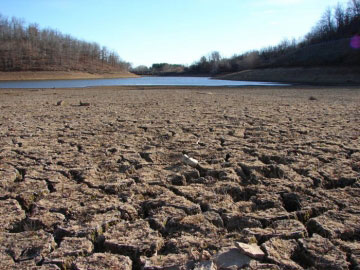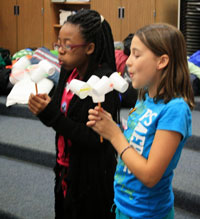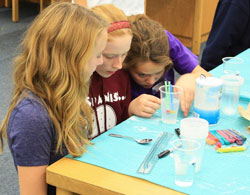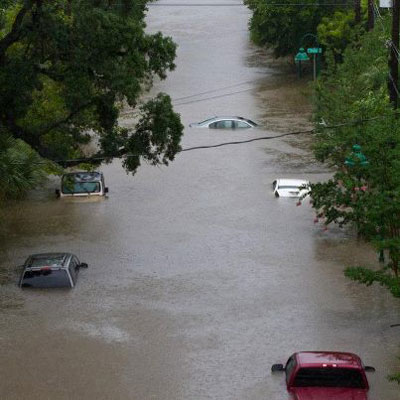Dear Florida Climate Center Friends,
We'd like to present you with the November 2013 edition of our newsletter. In this newsletter, you'll find our monthly climate summary, a list of special events that our staff attended, and a winter 2013-2014 climate outlook. If you have any questions, please email us at climate@coaps.fsu.edu.
Thanks,
The Staff of the Florida Climate Center
 |  |  | David Zierden
State Climatologist | James O'Brien
Professor Emeritus | Melissa Griffin
Asst. State Climatologist |
|
Fall Back Sunday, November 3
Just a reminder to everyone that Daylight Saving Time ends at 2:00 AM on Sunday, November 3rd. Remember to turn your clocks back an hour before you go to sleep Saturday night.
|
October Climate Summary for Florida
|
|
Winter 2013-2014 Climate Outlook
The Florida Climate Center has put together a climate outlook for the Southeastern United States for the winter of 2013-2014. With neutral conditions forecasted to continue in the Pacific Ocean over the next few months, the weather patterns across the Southeast will be more variable this winter.
|
 Project Monitors and Anticipates Drought in the ACF Basin The Florida Climate Center is involved in a pilot project with the National Integrated Drought Information System (NIDIS) to monitor and predict drought in the Apalachicola-Chattahoochee-Flint (ACF) River basin and involve all stakeholders in using climate and hydrologic information in making the best possible decisions when facing drought. The ACF Basin has suffered from several severe droughts in the last decade, including 2007, when there was a drinking water crisis in Atlanta, and also in 2011/2012, which played a role in the collapse of the Apalachicola oyster fishery. The NIDIS project involves representatives from many federal and state agencies in Georgia, Florida, and Alabama, including the US Geological Survey, NOAA's National Weather Service, the Army Corp of Engineers, the Florida and Georgia Departments of Environmental Protection, Alabama Water Resources, and many others. The pilot project began with several stakeholder workshops where information needs and decision processes were discussed. For the last three years, NIDIS has been holding bi- or tri-weekly webinars that assess the current state of drought in the basin, operations, and outlook for the next 1 to 3 months. Florida State Climatologist David Zierden has been serving as climate lead on these webinars, summarizing recent and current climate patterns and looking ahead to what we may expect in the future. Information on the NIDIS pilot and links to the webinars can be found at Drought.gov. |
 Assistant State Climatologist Presents at Tallahassee Area Schools
In early October, Assistant State Climatologist Melissa Griffin traveled to a local Tallahassee school and gave a presentation on the basics of weather and climate. As part of a 6-week rotation at the charter school, Ms. Griffin will be going back to give the same presentation to a new set of students in November and multiple times in 2014.
At the end of the month, Ms. Griffin, along with members from the Deep-C Consortium and undergraduate meteorology  students from the Center for Ocean-Atmospheric Prediction Studies (COAPS), took part in a Science Lock-In at a local middle school. About 100 7th grade students took part in the 2-hour activity that focused on meteorology and oceanography and included brief presentations and hands-on demonstrations and experiments, such as making anemometers, learning about densities of different fluids, learning about flood plains, examining a variety of ocean species, and more. students from the Center for Ocean-Atmospheric Prediction Studies (COAPS), took part in a Science Lock-In at a local middle school. About 100 7th grade students took part in the 2-hour activity that focused on meteorology and oceanography and included brief presentations and hands-on demonstrations and experiments, such as making anemometers, learning about densities of different fluids, learning about flood plains, examining a variety of ocean species, and more.
|
|
Upcoming Events
November 13-15, 2013:
Southeast Climate Consortium Fall Planning Meeting in Gainesville, FL
November 21, 2013:
North Florida American Meteorological Society/National Weather Association Meeting in Tallahassee, FL
December 10, 2013:
Extension Winter Weather School in Tavares, FL
January 13-17, 2014:
4-H Youth Development Institute Conference in Ocala, FL
January 25, 2013:
Children's Day at the Museum of Florida History in Tallahassee, FL
February 2-6, 2014:
94th Annual Meeting of the American Meteorological Society in Atlanta, GA
|
 Example Data Request The above normal rainfall this summer has led to an influx of requests for historical rainfall information from private citizens, engineering firms, and construction companies across the state this past month. In most cases, those requesting the data required data from June-August of this year and information on what their locations of interest would see in a typical summer. The issue of the heavy rains has also led to a partnership with the Florida Climate Center and 5 of the National Weather Services (NWS) Offices that serve the state. Over the next few weeks, the center will be working with hydrologists and meteorologists to determine how to identify the top 5 flood events for the entire state and each of the NWS Office County Warning Areas (CWA) in Florida. |
|
About Us
The Florida Climate Center is part of a three-tiered system of national, regional, and state climate offices, including NOAA's National Climatic Data Center and the Southeast Regional Climate Center. The Florida State Climatologist and other staff at the Florida Climate Center provide the following information and services to the people of Florida:
· Climate Data:
Historical weather observations for weather stations throughout the state of Florida. We are able to provide data for most stations from 1948-present.
· Climate Information:
Long-term historical averages for various stations, climate divisions, and the entire state.
· Extreme Event Records:
Information and analyses on extreme events such as freezes, droughts, floods and hurricanes.
· Special Analysis:
With their vast knowledge of El Niņo, La Niņa and climate variability, the State Climatologist and staff can offer expert insight into Florida's climate trends.
· Outreach:
Activities, presentations, and workshops that inform and educate the people of Florida about current and emerging climate issues. We also coordinate volunteers for the Community Collaborative Rain, Hail & Snow Network (CoCoRaHS).
More About Us
|
|